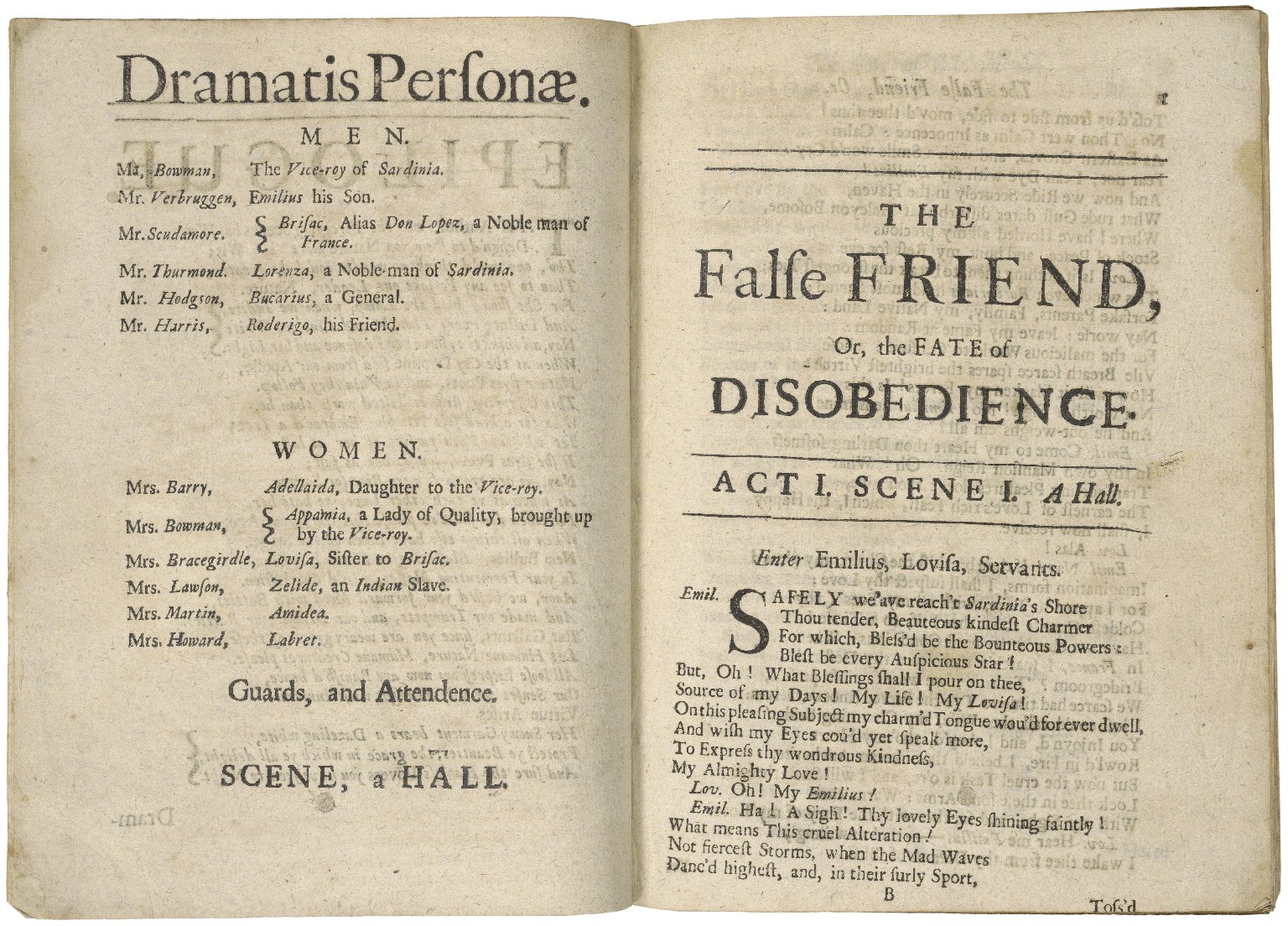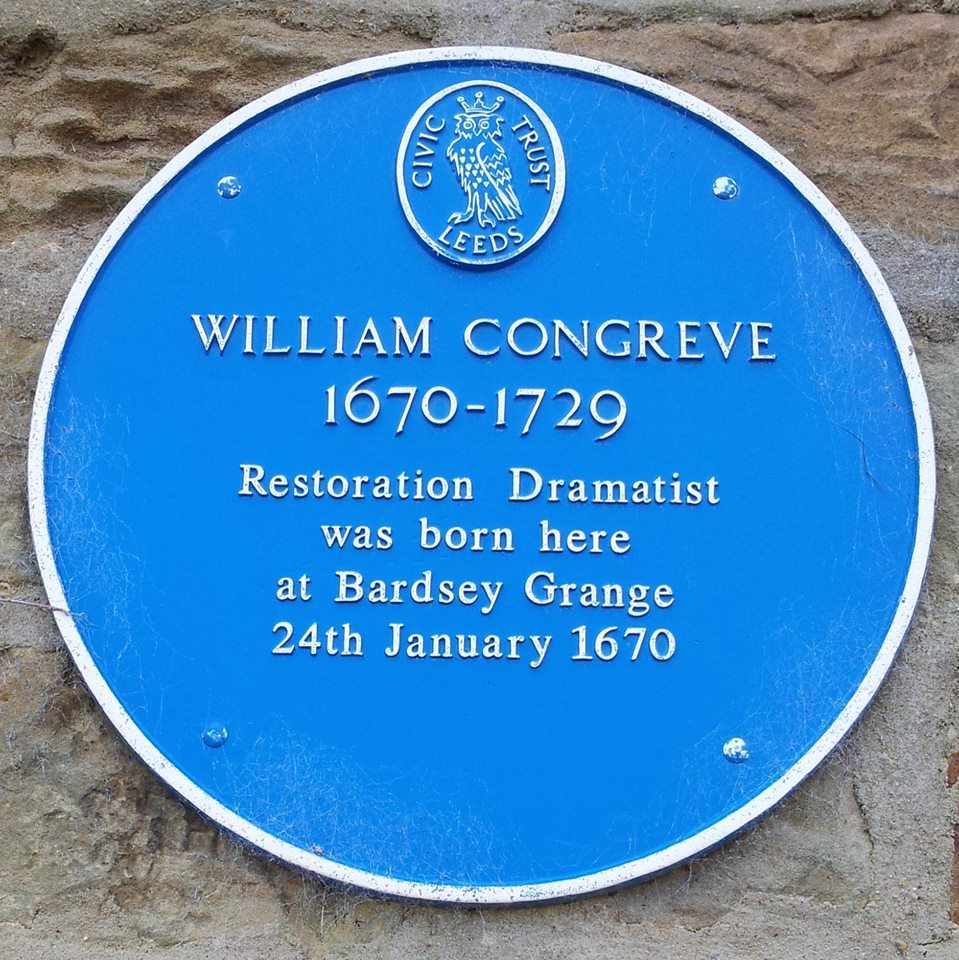|
The Deceiver Deceived
''The Deceiver Deceived'' is a comedy written by Mary Pix, first performed in 1697. Pix's unpublished manuscript was rejected by the actor and producer George Powell, who subsequently plagiarized it in his play ''Imposture Defeated'' (1697). Plot The play is about the misogynistic Melito Bondi, a Venetian senator who pretends to be blind in order to avoid the expense of becoming President of Dalmatia. As he is forced to continue the pretense in front of his family, Bondi must put up with the liberties that they subsequently take. The resourceful widow Lady Temptyouth helps Olivia (Bondi's wife) and Ariana (his daughter) to meet their gallants, Count Andrea and Fidelio. Bondi is secretly furious about Temptyouth's influence, but cannot interfere because she is also involved in his financial businesses. During the play Temptyouth helps to find a wealthy husband for Lucinda, an illegitimate girl whom she has raised. Towards the end of the play, Bondi reforms and becomes a somewh ... [...More Info...] [...Related Items...] OR: [Wikipedia] [Google] [Baidu] |
Mary Pix
Mary Pix (1666 – 17 May 1709) was an English novelist and playwright. As an admirer of Aphra Behn and colleague of Susanna Centlivre, Pix has been called "a link between women writers of the Restoration and Augustan periods". Early years Mary Griffith Pix was born in 1666, the daughter of a rector, musician and Headmaster of the Royal Latin School, Buckingham, Buckinghamshire; her father, Roger Griffith, died when she was very young, but Mary and her mother continued to live in the schoolhouse after his death. She was courted by her father's successor Thomas Dalby, but he left with the outbreak of smallpox in town, just one year after the mysterious fire that burned the schoolhouse. Rumour had it that Mary and Dalby had been making love rather energetically and overturned a candle which set fire to the bedroom. In 1684, at the age of 18, Mary Griffith married George Pix (a merchant tailor from Hawkhurst, Kent). The couple moved to his country estate in Kent. Her first son, ... [...More Info...] [...Related Items...] OR: [Wikipedia] [Google] [Baidu] |
George Powell (playwright)
George Powell (1668? – 1714) was a 17th-century London actor and playwright who was a member of the United Company. He was the son of the actor Martin Powell, a long-standing member of the King's Company. Plays In his playwrighting Powell has been called 'an unscrupulous and opportunistic appropriator, gleaning materials from a variety of sources'. He was embroiled in a plagiarism scandal after writing a misogynistic play called ''The Imposture Defeated; or, A Trick to Cheat the Devil'', first performed in September 1697. This play portrayed the proper treatment of an adulteress as brutal confinement and isolation from others to punish her and prevent the spread of her attitude. It is widely accepted that Powell had plagiarised from the then unpublished manuscript of Mary Pix's ''The Deceiver Deceived''. Theatre critic Charles Gildon called Powell's version the inferior of the two. Powell also wrote the plays '' Alphonso, King of Naples'' (first performed in December 1690 ... [...More Info...] [...Related Items...] OR: [Wikipedia] [Google] [Baidu] |
Thomas Betterton
Thomas Patrick Betterton (August 1635 – 28 April 1710), the leading male actor and theatre manager during Restoration England, son of an under-cook to King Charles I, was born in London. Apprentice and actor Betterton was born in August 1635 in Tothill Street, Westminster.''The National Cyclopaedia of Useful Knowledge'', Vol.III, London, Charles Knight, 1847, p.273 He was apprenticed to John Holden, Sir William Davenant's publisher, and possibly later to a bookseller named John Rhodes, who had been wardrobe-keeper at the Blackfriars Theatre. In 1659, Rhodes obtained a license to set up a company of players at the Cockpit Theatre in Drury Lane; and on the reopening of this theatre in 1660, Betterton made his first appearance on the stage. Betterton's talents at once brought him into prominence, and he was given leading parts. On the opening of the new theatre in Lincoln's Inn Fields in 1661, Davenant, the patentee of the Duke's Company, engaged Betterton and all Rhodes's co ... [...More Info...] [...Related Items...] OR: [Wikipedia] [Google] [Baidu] |
Lincoln's Inn Fields
Lincoln's Inn Fields is the largest public square in London. It was laid out in the 1630s under the initiative of the speculative builder and contractor William Newton, "the first in a long series of entrepreneurs who took a hand in developing London", as Sir Nikolaus Pevsner observes. The original plan for "laying out and planting" these fields, drawn by the hand of Inigo Jones, was said still to be seen in Lord Pembroke's collection at Wilton House in the 19th century, but its location is now unknown. The grounds, which had remained private property, were acquired by London County Council in 1895 and opened to the public by its chairman, Sir John Hutton, the same year. The square is today managed by the London Borough of Camden and forms part of the southern boundary of that borough with the City of Westminster. Lincoln's Inn Fields takes its name from the adjacent Lincoln's Inn, of which the private gardens are separated from the Fields by a perimeter wall and a large ga ... [...More Info...] [...Related Items...] OR: [Wikipedia] [Google] [Baidu] |
Elizabeth Barry
Elizabeth Barry (1658 – 7 November 1713) was an English actress of the Restoration period. Elizabeth Barry's biggest influence on Restoration drama was her presentation of performing as the tragic actress. She worked in large, prestigious London theatre companies throughout her successful career: from 1675 in the Duke's Company, 1682 – 1695 in the monopoly United Company, and from 1695 onwards as a member of the actors' cooperative usually known as Betterton's Company, of which she was one of the original shareholders. Her stage career began 15 years after the first-ever professional actresses had replaced Shakespeare's boy heroines on the London stage. The actor Thomas Betterton said that her acting gave "success to plays that would disgust the most patient reader", and the critic and playwright John Dennis described her as "that incomparable Actress changing like Nature which she represents, from Passion to Passion, from Extream to Extream, with piercing Force and w ... [...More Info...] [...Related Items...] OR: [Wikipedia] [Google] [Baidu] |
Peter Anthony Motteux
Peter Anthony Motteux (born Pierre Antoine Motteux ; 25 February 1663 – 18 February 1718) was a French-born English author, playwright, and translator. Motteux was a significant figure in the evolution of English journalism in his era, as the publisher and editor of ''The Gentleman's Journal'', "the first English magazine," from 1692 to 1694. Life A native of Rouen, he was a French Huguenot who came to England in 1685 after the revocation of the Edict of Nantes. At first he lived with his godfather, Paul Dominique, and made his living as an auctioneer; by 1706 he maintained a shop in Leadenhall Street, selling imports from China, Japan, and India, and (in his own words) "silks, lace, linens, pictures, and other goods." He also held a position with the Post Office in the first decade of the 18th century. His death in a bawdy house was thought to be suspicious, and caused a good deal of legal disturbance. Five people were tried for his murder, but were acquitted. He was survived ... [...More Info...] [...Related Items...] OR: [Wikipedia] [Google] [Baidu] |
William Congreve
William Congreve (24 January 1670 – 19 January 1729) was an English playwright and poet of the Restoration period. He is known for his clever, satirical dialogue and influence on the comedy of manners style of that period. He was also a minor political figure in the British Whig Party. Early life William Congreve was born in Bardsey Grange, on an estate near Ledston, West Riding of Yorkshire. Although Samuel Johnson disputed this, it has since been confirmed by a baptism entry for "William, sonne of Mr. William Congreve, of Bardsey grange, baptised 10 February 1669" .e. 1670 by the modern reckoning of the new year His parents were Colonel William Congreve (1637–1708) and Mary Browning (1636?–1715), who moved to London in 1672, then to the Irish port of Youghal. Congreve was educated at Kilkenny College, where he met Jonathan Swift, and at Trinity College Dublin. He moved to London to study law at the Middle Temple, but preferred literature, drama, and the fashionable ... [...More Info...] [...Related Items...] OR: [Wikipedia] [Google] [Baidu] |
1697 Plays
Events January–March * January 8 – Thomas Aikenhead is hanged outside Edinburgh, becoming the last person in Great Britain to be executed for blasphemy. * January 11 – French writer Charles Perrault releases the book ''Histoires ou contes du temps passé'' (literally "Tales of Past Times", known in England as "Mother Goose tales") in Paris, a collection of popular fairy tales, including ''Cinderella'', ''Puss in Boots'', ''Red Riding Hood'', ''The Sleeping Beauty'' and ''Bluebeard''. * February 8 – The English infantry regiment of Arthur Chichester, 3rd Earl of Donegall is disbanded four years after it was first raised. * February 22 – Gerrit de Heere becomes the new Governor of Dutch Ceylon, succeeding Thomas van Rhee and administering the colony for almost six years until his death. * February 26 – Conquistador Martín de Ursúa y Arizmendi and 114 soldiers arrive at Lake Petén Itzá in what is now Guatemala and begin the Spanish conquest of Guatemala with a ... [...More Info...] [...Related Items...] OR: [Wikipedia] [Google] [Baidu] |
Plays By Mary Pix
Play most commonly refers to: * Play (activity), an activity done for enjoyment * Play (theatre), a work of drama Play may refer also to: Computers and technology * Google Play, a digital content service * Play Framework, a Java framework * Play Mobile, a Polish internet provider * Xperia Play, an Android phone * Rakuten.co.uk (formerly Play.com), an online retailer * Backlash (engineering), or ''play'', non-reversible part of movement * Petroleum play, oil fields with same geological circumstances * Play symbol, in media control devices Film * Play (2005 film), ''Play'' (2005 film), Chilean film directed by Alicia Scherson * ''Play'', a 2009 short film directed by David Kaplan (filmmaker), David Kaplan * Play (2011 film), ''Play'' (2011 film), a Swedish film directed by Ruben Östlund * Rush (2012 film), ''Rush'' (2012 film), an Indian film earlier titled ''Play'' and also known as ''Raftaar 24 x 7'' * The Play (film), ''The Play'' (film), a 2013 Bengali film Literature and pu ... [...More Info...] [...Related Items...] OR: [Wikipedia] [Google] [Baidu] |
Comedy Plays
Comedy is a genre of fiction that consists of discourses or works intended to be humorous or amusing by inducing laughter, especially in theatre, film, stand-up comedy, television, radio, books, or any other entertainment medium. The term originated in ancient Greece: in Athenian democracy, the public opinion of voters was influenced by political satire performed by comic poets in theaters. The theatrical genre of Greek comedy can be described as a dramatic performance pitting two groups, ages, genders, or societies against each other in an amusing '' agon'' or conflict. Northrop Frye depicted these two opposing sides as a "Society of Youth" and a "Society of the Old". A revised view characterizes the essential agon of comedy as a struggle between a relatively powerless youth and the societal conventions posing obstacles to his hopes. In this struggle, the youth then becomes constrained by his lack of social authority, and is left with little choice but to resort to ruses wh ... [...More Info...] [...Related Items...] OR: [Wikipedia] [Google] [Baidu] |





